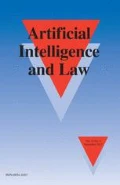Abstract
Governments and other groups interested in the views of citizens require the means to present justifications of proposed actions, and the means to solicit public opinion concerning these justifications. Although Internet technologies provide the means for such dialogues, system designers usually face a choice between allowing unstructured dialogues, through, for example, bulletin boards, or requiring citizens to acquire a knowledge of some argumentation schema or theory, as in, for example, ZENO. Both of these options present usability problems. In this paper, we describe an implemented system called PARMENIDES which allows structured argument over a proposed course of action, without requiring knowledge of the underlying argumentation theory.
Similar content being viewed by others
References
Arrow K. J. (1951) Social Choice and Individual Values. Wiley, New York
Bench-Capon, T. J. M. (1998). Specification and Implementation of Toulmin Dialogue Game. In Proceedings of JURIX 98 (JURIX-1998), 5–20, GNI: Nijmegen
Bessette J. (1980) Deliberative Democracy: The Majority Principle in Republican Government. In Goldwin R. A., Schambra W. A. (eds) How Democratic is the Constitution? American Enterprise Institute, Washington, DC, USA, 102–116
Bohman, J. and Rehg, W. Introduction, ix–xxx. In (Bohman and Rehg 1997)
Bohman J., Rehg W. (eds) (1997) Deliberative Democracy: Essays on Reason and Politics. MIT Press, Cambridge, MA, USA
Downs A. (1957) An Economic Theory of Democracy. Harper and Row, New York, NY, USA
Fiorino D. J. (1989) Environmental Risk and Democratic Process: A Critical Review. Columbia Journal of Environmental Law 14:501–547
Forester J. (1999) The Deliberative Practitioner: Encouraging Participatory Planning Processes. MIT Press, Cambridge, MA, USA
Gordon, T. F. and Karacapilidis, N. I. (1997). The Zeno Argumentation Framework. In Proceedings of 6th International Conference on AI and Law (ICAIL-2003), 10–18, ACM Press: New York
Gordon T. F, Richter G. (2002) Discourse Support Systems for Deliberative Democracy. In: Traunmüller R., Lenk K. (eds) EGOV 2002, Lecture Notes in Computer Science 2456. Springer, Berlin, Germany, 238–255
Greenwood K. M., Bench-Capon T. J. M., McBurney P. (2003a) Structuring dialogue between the People and their representatives. In: Traunmüller R. (ed) Electronic Government (EGOV 2003), Lecture Notes in Computer Science 2739. Springer, Berlin, 55–62
Greenwood, K. M., Bench-Capon, T. J. M. and McBurney, P. (2003b). Towards a Computational Account of Persuasion in law. In Proceedings of 9th International Conference on AI and Law (ICAIL-2003), 22–31, ACM Press: New York
Habermas, J. (1998). In Cronin, C. and De Greiff P. (eds.), The Inclusion of the Other: Studies in Political Theory, MIT Press: Cambridge, MA, USA
Lührs R., Albrecht S., Lübcke M., Hohberg B. (2003) How to Grow? Online Consultation about Growth in the City of Hamburg: Methods, Techniques, Success Factors. In: Traunmüller R. (ed) Electronic Government (EGOV 2003), Lecture Notes in Computer Science 2739. Springer, Berlin, Germany, 79–84
McBurney P., Parsons S. (2001) Intelligent Systems to Support Deliberative Democracy in Environmental Regulation. Information and Communications Technology Law 10(1):33–43
McBurney P., Parsons S. (2004) Engineering Democracy in Open Agent Systems. In: Omicini A., Petta P., Pitt J. (eds) Engineering Societies in the Agents World IV, Lecture Notes in Artificial Intelligence 3071. Springer, Berlin, Germany, 66–80
Michelman F. I. (1989) Conceptions of Democracy in American Constitutional Argument: The Case of Pornography Regulation. Tennessee Law Review 56:291–319
Rousseau, J. J. (1994). The Social Contract, Oxford University Press: Oxford, UK. Published 1762. Translated by Christopher Betts, in a volume entitled: Discourse on Political Economy and The Social Contract
Sæbø Ø., Nilsen H. (2004) The Support for Different Democracy Models by the Use of a Web based Discussion Board. In: Traunmüller R. (ed) Electronic Government (EGOV 2004), Lecture Notes in Computer Science 3183. Springer, Berlin, 23–26
Schumpeter, J. (1950). Capitalism, Socialism, and Democracy, Harper: New York, USA, third edition, 1950. First edition 1942
Webler T., Tuler S., Krueger R. (2001) What is a Good Public Participation Process? Five Perspectives from the Public. Environmental Management 27(3):435–450
Acknowledgments
We are grateful to Sam Atkinson for his invaluable help in implementing PARMENIDES. A shorter version of this paper was presented at EGOVERNMENT 2004 conference (Zaragoza, Spain, September 2004) and we are grateful to the anonymous reviewers and to the conference audience for their comments. Katie Atkinson is grateful for support from the UK Engineering and Physical Sciences Research Council (EPSRC). Trevor Bench-Capon and Peter McBurney acknowledge financial support received from the European Commission’s Information Society Technologies (IST) programme, through Project ASPIC (IST-FP6-002307).
Author information
Authors and Affiliations
Corresponding author
Rights and permissions
About this article
Cite this article
Atkinson, K., Bench-Capon, T. & McBurney, P. PARMENIDES: Facilitating Deliberation in Democracies. Artif Intell Law 14, 261–275 (2006). https://doi.org/10.1007/s10506-006-9001-5
Published:
Issue Date:
DOI: https://doi.org/10.1007/s10506-006-9001-5




